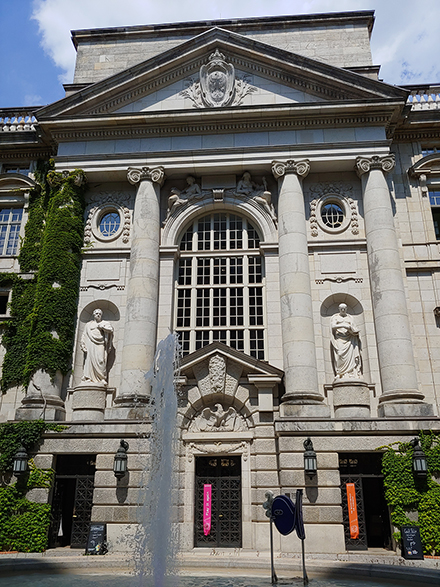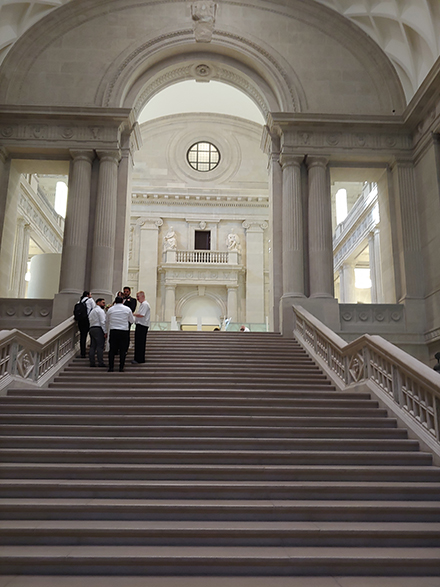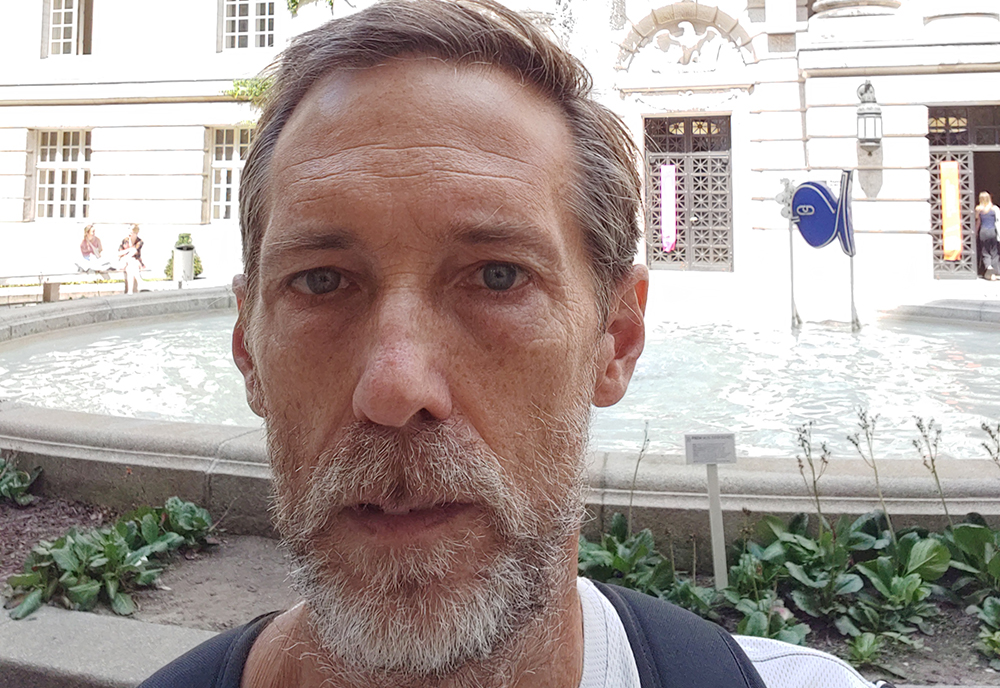The USF College of Arts and Sciences Humanities Institute, granted its coveted summer grants to distinguished faculty members engaged in humanities related research.

The Staatsbibliothek zu Berlin research library. (Photo courtesy of Joshua Rayman)
This year, the grant was awarded to a total of 12 faculty members who embarked on a summer journey across the United States and the globe, in search of information to support their research efforts.
Joshua Rayman, an associate professor in the Department of Philosophy, was selected as a grant recipient. Rayman specializes in nineteenth- and twentieth-century continental philosophy. His research focuses on the contrasting ideologies of two renowned German thinkers around these time periods: Immanuel Kant and Friedrich Nietzsche.
Kant is an Enlightenment philosopher who is celebrated for his advocacy of universal rights and democracy. Nietzsche is a counter-Enlightenment philosopher who explores themes of aristocracy, war, and power. Rayman’s objective is to explore the intricate relationship between these opposing political ideologies and discover what we can learn from them today.
“Kant and Nietzsche's philosophies have represented two poles of thought to me. One is a philosophy of the universal and necessary, the other is a philosophy of difference and change, both of which touch on important elements of our experience. We need general laws, claims to knowledge, and universal values. On the other hand, we need to recognize the role our perspective has in any claim to knowledge and the way in which our differences may prompt us to rethink our perspectives,” he said. “The back and forth between Nietzsche and Kant thus spurs us to critical and creative ways of thinking. For instance, both would agree that when people make claims about the world as it really is, they are relying on human categories of thought that can only be applied to our experience, not to things in themselves.”
With the support of the Humanities Institute Summer Grant, Rayman had the opportunity to travel to the renowned Staatsbibliothek zu Berlin this past summer. This expansive research library, comprising both classical and modernist architecture, provided him with a plethora of resources to use for his research.
Rayman started his research on this subject back in January of 2022. While his work is still in progress, he shared his initial motivation for what sparked his interest in this topic.
“This work has grown out of my dissertation research, which originally involved Nietzsche's critique of Kantian universality, and a Kantian response in Kant's philosophy of difference. So, I was already interested both in opposing Kant and Nietzsche as examples of the universalistic and anti-universalistic traditions and in identifying their hidden similarities and common approaches to philosophy. At the time, the styles of the two parts of the dissertation were too disparate, so I set aside anything outside Nietzsche’s critique of Kant. However, I remained interested in revisiting the relationship of Kant and Nietzsche and took this opportunity to research the topic,” Rayman said.
Through Rayman's travels to the Berlin library, he gained a fresh perspective that led to some thought-provoking discoveries.
“So far, I have found surprising continuities between Kant and Nietzsche. Usually, they are thought of as polar opposites, the one an Enlightenment rationalist in favor of universal rights, the other an anti-Enlightenment thinker in favor of aristocracy. It turns out that they share quite a few views basic to their political theories, from aristocratic preferences to views of the universe as constant flux and war,” Rayman said.

The interior staircase of the Staatsbibliothek zu Berlin library. (Photo courtesy of Joshua Rayman)
It was through this opportunity that Rayman was able to draw comparisons between Kant and Nietzsche and is preparing to write more on the scope of their knowledge and beliefs. He expressed his gratitude for the summer grant and shared his optimistic outlook for the future.
“The 2023 Humanities Institute Summer Grant made it possible for me to travel to Berlin and to expand my comparative study into a substantial draft for a book manuscript with all the sources I needed and very few distractions. It was extremely valuable to me to be able to focus on this work, and therefore, make a great deal of progress.” Rayman continues, “I would like to change the way that people view the Enlightenment project by changing the way that people view Kant and Nietzsche, specifically, as broader, more comprehensive thinkers that express a range of perspectives, even ones that resist their own prevailing views.”
Additional recipients of the 2023 Humanities Institute Summer Grant include: Zaib un Nisa Aziz, Gil Ben-Herut, Scott Ferguson, J. Michael Francis, David Johnson, Dillion Mahoney, Alejandro Márquez, Rachel May, Adrian O’Connor, Adriana Novoa, and Nicolas Thompson.
Learn more about funding opportunities and the summer grant program offered by the Humanities Institute.
